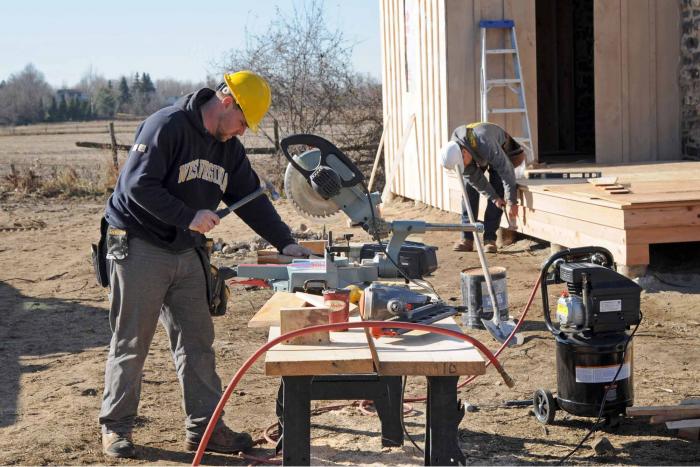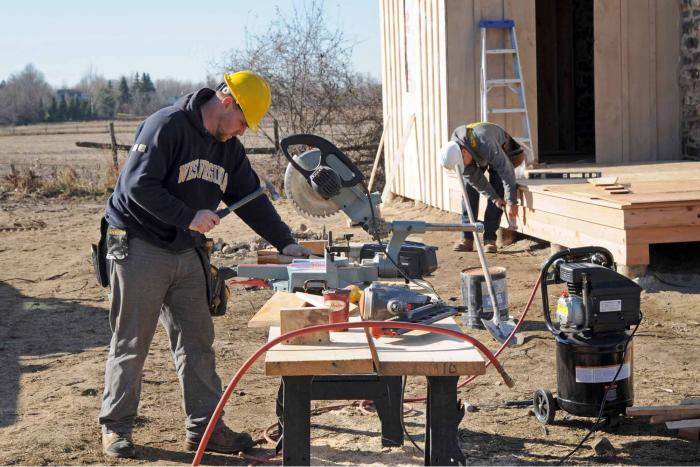If you’ve ever wondered if carpentry is a good career in Canada, you’re in the right place! Carpentry can be an incredibly rewarding profession, and in this article, we’ll explore why. Whether you have a passion for working with your hands, enjoy problem-solving, or simply want a career that offers stability and growth, carpentry has a lot to offer. Let’s dive in and discover the exciting world of carpentry in Canada! So, grab your tool belt and let’s get started!
Discover the opportunities of carpentry as a career in Canada. With its strong demand, competitive salaries, and potential for growth, carpentry offers a promising path. Gain skills through apprenticeships, vocational training, or trade schools. Embrace the satisfaction of building structures and creating tangible results. With opportunities in residential, commercial, and industrial sectors, carpentry provides stability and the chance to showcase your craftsmanship. Explore the wide range of possibilities in the thriving Canadian carpentry industry.

Is Carpentry a Good Career in Canada?
When it comes to choosing a career, many factors come into play. In Canada, carpentry is a trade that has stood the test of time and continues to offer promising opportunities. With a strong demand for skilled carpenters, competitive salaries, and the ability to work in diverse industries, carpentry can be a rewarding and fulfilling career choice. In this article, we will explore the reasons why carpentry is a good career in Canada, diving into the benefits, job outlook, and tips for success in the field.
The Benefits of a Career in Carpentry
Carpentry offers a range of benefits that make it an appealing career option for many individuals. Firstly, carpenters have the opportunity to work with their hands and see their creations come to life. The tangible results of their work can provide a great sense of accomplishment and pride. Additionally, carpentry is a skill that is always in demand, regardless of economic fluctuations. This means that carpenters can enjoy job security and stability in the long term.
Another benefit of a career in carpentry is the potential for self-employment or entrepreneurship. Many carpenters choose to start their own businesses, allowing them to be their own boss and set their own schedules. This level of independence can be highly rewarding for those who crave autonomy and flexibility. Moreover, as a carpenter gains experience and expertise, they can command higher rates and expand their clientele, leading to increased earning potential.
Lastly, carpentry offers the opportunity for lifelong learning and growth. As new technologies and techniques emerge, carpenters must adapt and update their skills accordingly. This constant evolution ensures that the work remains interesting and engaging, preventing stagnation. Whether through apprenticeships, certifications, or vocational training, carpenters can continue to develop their expertise and stay relevant in a dynamic industry.
The Job Outlook for Carpenters in Canada
In Canada, the job outlook for carpenters is highly favorable. With a thriving construction industry and an ongoing need for skilled tradespeople, carpenters can expect a steady stream of job opportunities. According to the Government of Canada’s Job Bank, the employment prospects for carpenters in the country are rated as good. This means that there is a balance between the supply of workers and the demand for their services.
Carpenters can find employment in a variety of sectors including residential construction, commercial construction, renovations, and industrial projects. They may work for construction companies, contractors, or become self-employed. The ability to specialize in areas such as framing, finishing, or cabinetry further enhances job prospects, as it allows carpenters to cater to specific client needs.
Furthermore, as skilled trades continue to face a labor shortage in Canada, carpenters are in high demand. This shortage can lead to increased wages and benefits for those in the field. The aging population of skilled carpenters also presents opportunities for young professionals to step into senior roles or take over established businesses.
Tips for Success in Carpentry
While carpentry can be a rewarding career, success in the field requires a combination of technical skills, experience, and personal qualities. Here are some tips for aspiring carpenters:
- Get formal training: Pursue apprenticeships, vocational programs, or certifications to gain the necessary skills and knowledge.
- Practice and develop skills: As with any craft, practice is key to becoming a skilled carpenter. Seek opportunities to hone your skills and learn from experienced professionals.
- Seek mentorship: Find experienced carpenters who can guide and mentor you in your journey. Their guidance can prove invaluable in learning the trade and navigating the industry.
- Stay updated on industry trends: Keep up with advancements in technology, building codes, and techniques to remain competitive and ensure high-quality work.
- Develop strong communication skills: Carpentry often involves working with clients, contractors, and other tradespeople. Effective communication skills are essential for understanding requirements and collaborating effectively.
- Build a strong network: Networking is crucial in any industry. Connect with professionals, join trade associations, and attend industry events to expand your contacts and opportunities.
- Embrace lifelong learning: Continually seek opportunities for growth and professional development. Stay curious and open to learning new skills to stay ahead in the field.
The Future of Carpentry in Canada
As the construction industry in Canada continues to grow, the demand for skilled carpenters is expected to remain strong. With projects ranging from residential homes to commercial buildings, the need for carpenters who can deliver high-quality craftsmanship will persist. The industry is also shifting towards sustainable practices, creating opportunities for carpenters with expertise in green building techniques and materials.
Earning Potential as a Carpenter in Canada
The earning potential for carpenters in Canada can vary depending on factors like location, experience, and specialization. According to the Government of Canada’s Job Bank, the median wage for carpenters in the country is around $25 per hour. However, experienced carpenters who have developed niche skills or have their own businesses can earn significantly higher incomes.
Conclusion
Overall, carpentry is a promising career choice in Canada. With its numerous benefits, strong job outlook, and opportunities for growth and advancement, it offers a fulfilling and financially rewarding path. By acquiring the necessary skills, staying updated on industry trends, and continuously developing their craft, aspiring carpenters can embark on a successful career in this dynamic field.
Key Takeaways: Is Carpentry a Good Career in Canada?
- Carpentry is a rewarding career choice in Canada, offering job security and growth opportunities.
- Skilled carpenters are in high demand across various industries, such as construction, renovation, and manufacturing.
- Carpenters have the chance to work on interesting projects, from building homes to crafting furniture.
- Carpentry allows for creativity and problem-solving skills, making it a fulfilling career.
- With the right training and experience, carpenters can earn a good income and have room for advancement.
Frequently Asked Questions
If you’re considering a career in carpentry in Canada, you may have some questions about its prospects and potential. Here are some common queries answered for you:
1. What are the job prospects like for carpenters in Canada?
In Canada, the demand for skilled carpenters is steadily growing. With ongoing construction projects and a need for renovation and repair work, there is a consistent demand for carpenters. Additionally, as older carpenters retire, there is a need for new talent to fill in the gaps, resulting in job opportunities.
Moreover, carpenters that possess specialized skills, like sustainable building techniques or working with heritage structures, have an even better chance of finding meaningful and lucrative work in Canada.
2. Is carpentry a well-paid career in Canada?
Yes, carpentry can be a well-paid career in Canada. While entry-level wages may be modest, experienced carpenters with advanced skills and expertise can command higher salaries. Additionally, unionized carpenters often receive good pay, benefits, and retirement packages.
Furthermore, self-employed carpenters have the opportunity to set their own rates and potentially earn more based on their skill set and reputation. By continuously honing their craft, staying updated with industry standards, and taking on challenging projects, carpenters can build a successful and lucrative career in Canada.
3. Are there opportunities for career growth in carpentry?
Absolutely! Carpentry offers great potential for career growth. As a carpenter gains experience and showcases their talent and expertise, they can progress to more senior roles within a company or take on supervisory positions. They can also specialize in certain areas of carpentry, such as furniture making, millwork, or cabinet making.
Moreover, carpenters can also start their own businesses and become independent contractors or even start their own carpentry firms. This allows for even greater career growth and the ability to take on larger and more prestigious projects. The key is to continuously learn and expand one’s skills to capitalize on the various opportunities available in the field.
4. Is formal education required to become a carpenter in Canada?
While formal education is not always mandatory to become a carpenter in Canada, it can certainly be beneficial. Many aspiring carpenters complete apprenticeships or vocational programs to gain hands-on experience and learn the trade from seasoned professionals.
Furthermore, obtaining a certification, such as the Red Seal Certification, can enhance job prospects and demonstrate a high level of skill and expertise. However, experience, dedication, and a strong work ethic are also highly valued attributes in the carpentry field, and these can be gained through practice and on-the-job training.
5. What personal qualities and skills are important for a successful career in carpentry?
To excel in a carpentry career, several qualities and skills are essential. Strong problem-solving and critical thinking abilities are valuable when tackling complex projects and finding creative solutions. Attention to detail and precision are also crucial to ensure accurate measurements and quality workmanship.
Communication skills are necessary for effectively collaborating with clients, contractors, and other professionals in the construction industry. Physical strength and stamina are important, as carpentry often involves lifting heavy materials and performing physically demanding tasks. Finally, a passion for craftsmanship, a sense of pride in one’s work, and a commitment to safety are all key factors in a successful and fulfilling carpentry career in Canada.

Summary
Being a carpenter in Canada can be a great career choice. It offers a lot of job opportunities, good pay, and the chance to work with your hands. You can learn the skills through apprenticeships and gain valuable experience. The demand for carpenters is high, and there are many different areas to specialize in. It’s a reliable and fulfilling path for those who enjoy working with wood and creating things with their own hands. So, if you’re interested in carpentry, Canada is a promising place to pursue this career.
